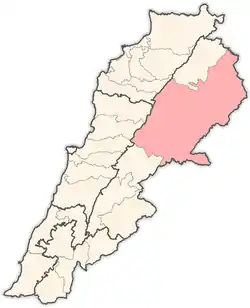Bechouat
Bechouat (also Beshouat) (Arabic: بشوات) is a Lebanese village in the Beqaa Valley of Lebanon. The village is famous for the Sanctuary of Our Lady of Bechouat, a Marian shrine and the site of Christian pilgrimage. Divine miracles have been reported and attributed to Our Lady of Bechouat.
Bechouat
بشوات | |
|---|---|
 Bechouat Location in Lebanon | |
| Coordinates: 34°09′N 36°08′E | |
| Country | |
| Governorate | Baalbek-Hermel |
| District | Baalbek |
| Time zone | UTC+2 (EET) |
| • Summer (DST) | +3 |
The people of Bechouat are Lebanese and followers of the Maronite Catholic Church. The ancestors of the inhabitants of the village came to Bechouat from Bsharri at the beginning of the 17th century.
The Church of Our Lady of Bechouat was built over the ruins of a Roman temple in the 18th century. An ancient oak tree shades the church’s small courtyard.
The name Bechouat has Aramaic origins, meaning "initiation" or "facilitator".[1]
Archeological artifacts, such as jars and pottery, have been found in Bechouat’s funerary caves and rock-cut tombs. A votive stone altar with representations of the Heliopolitan Triad was also found in the village.[1]
Notable People:
Dr Kabalan Keirouz, (1934-1976) former Dean of the Lebanese University, Faculty of Law & Political Sciences Writer of the "Moroccan Code of Labor" in 1962. Writer of many other publications still used by major universities and schools nowadays
References
External links
- Bechouat, Localiban
